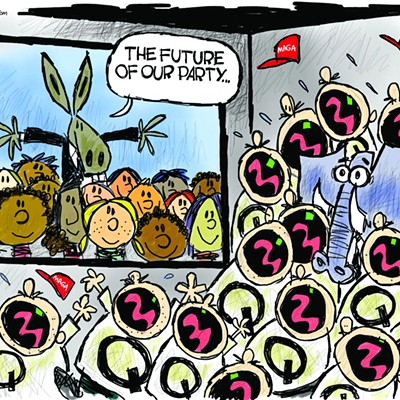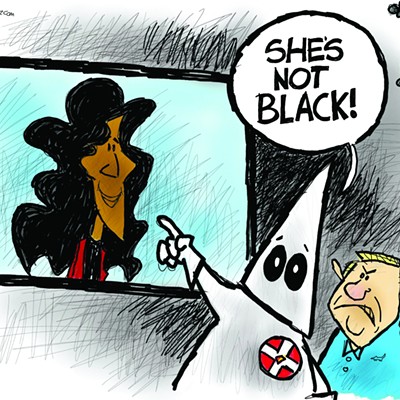ARIZONA'S 14 statewide ballot props brought a downpour of campaign dollars. Although final numbers won't be available until later this year, various reports through Election Day show that at least $16 million was spent on prop campaigns.
The most money was spent opposing Prop 202, the Citizens Growth Management Initiative, which would have forced communities to establish growth boundaries and impose steep impact fees for streets, schools and infrastructure on developers. Opponents of Prop 202, through various campaign committees, raised more than $4.7 million for a slick media bombardment that dragged support for the measure from roughly 70 percent last spring to about 30 percent on Election Day.
Citizens for Growth Management, the committee pushing the initiative, couldn't hope to counter that kind of war chest. The group raised at least $857,250, but that included spending to put the measure on the ballot.
The contest over the Arizona Legislature's Growing Smarter referendum, Prop 100, was much closer. As of press time, it was trailing, with about 51 percent of the voters nixing the measure.
Prop 100 was opposed by nearly every conservation group in the state. The measure would have set aside up to 3 percent of state trust land for conservation, allowed schools to use state trust land and allowed land swaps with other governmental jurisdictions.
While a final tally was not available as of deadline, Prop 100 may have been a case where the biggest bankroll did not prevail. Supporters of Prop 100, including the Greater Phoenix Leadership, Arizona Public Service and the Arizona Association of Realtors, raised at least $950,000, which paid for glossy mailers and TV ads featuring Gov. Jane Dee Hull hiking the desert.
Opponents complained that Prop 100 protected mountaintops and lakebeds that couldn't be developed in any case. They were apparently able to get their message out, even though they were only able to raise about $147,000, with the largest contributions coming from the Sonoran Institute and Nature Conservancy.
Healthcare for low-income Arizonans became muddled with the passage of both Prop 200 and Prop 204. Prop 204 passed with the larger margin, capturing almost 64 percent of the vote as of press time. Prop 200, meanwhile, passed with about 58 percent of the vote. Both measures used the state's tobacco lawsuit settlement dollars for a variety of healthcare programs. Details about which programs will now be implemented will be sorted out, possibly in the courtroom.
Disgust with the legislature's alt-fuel debacle ensured that lawmakers would not get a $6,000 pay raise. Prop 300, which would have increased legislative salaries to $30,000, was defeated by 63 percent of the voters.
That alt-fuel scandal may have contributed to the victory of Prop 106, which stripped lawmakers of the power to draw legislative and congressional district boundaries. The measure passed with 56 percent of the vote.
This was another case where the bigger wallet carried the day. Supporters of Prop 106--primarily Scottsdale developer Jim Pederson, who kicked in roughly $689,000--raised more than $880,000. Opponents, led by state Treasurer Carol Springer, started their campaign late, but raised at least $187,500 for a last-minute negative assault. The money came from--note the trend--the Nevada Republican Party, the Arizona Republican Party, the Republican National Committee and Republican National State Election Committee.
On the education front, voters approved Prop 301 by about 53 percent, raising the state sales tax by .6 of a cent, with revenues dedicated to education funding.
Arizonans banned bilingual education with the passage of Prop 203 by 63 percent of the vote. It was a big win for Ron Unz, the California entrepreneur who spearheaded a similar campaign to eliminate bilingual ed in California two years ago. Unz almost singlehandedly also funded the Arizona effort, spending more than $150,000 to put the measure on the ballot. Unz may now take the measure to other states in future elections.
Educational and Native American groups financed most of the opposition to Prop 203. Three separate committees formed to oppose the bilingual ban, but none of them got off the ground before September. Arizonans Opposed to Prop 203 raised more than $135,000, mainly from the Salt River Pima-Maricopa Indian Community and Greater Phoenix Leadership; English Plus More raised more than $100,000, with large contributions from the Arizona Association of Bilingual Education, the Arizona School Board Association, the Pascua Yaqui Nation and the Tohono O'odham Nation; and No on 203-2000 received $80,000 from the National Educational Association.
Arizonans shot down Prop 102, which would have amended the state constitution to force future wildlife propositions to pass by a two-thirds margin. More than 62 percent of the voters rejected the proposal, although it wasn't quite a two-thirds margin.
The biggest margin of the night was the rejection of Prop 108 by 80 percent of the voters. This initiative, placed on the ballot by U S West/Qwest, would have reduced regulation of telephone utilities. U S West/Qwest put more than $2 million into the effort, including dollars spent gathering signatures, but canceled a last-minute advertising blitz. Opponents--primarily AT&T and Cox Communications--raised more than $1,482,000 for the opposition campaign.
Voters increased the Corporation Commission from three to five members by passing Prop 103 by 53 percent of the vote.
Prop 104, which froze residential property values for low-income seniors, won with 64 percent of the vote. Prop 105, which exempted cemetery property from taxation, also passed, with more than 68 percent of the vote.
Finally, voters in Pima County rejected a 1 percent hotel bed tax dedicated to boosting tourism 49-45 percent.

















